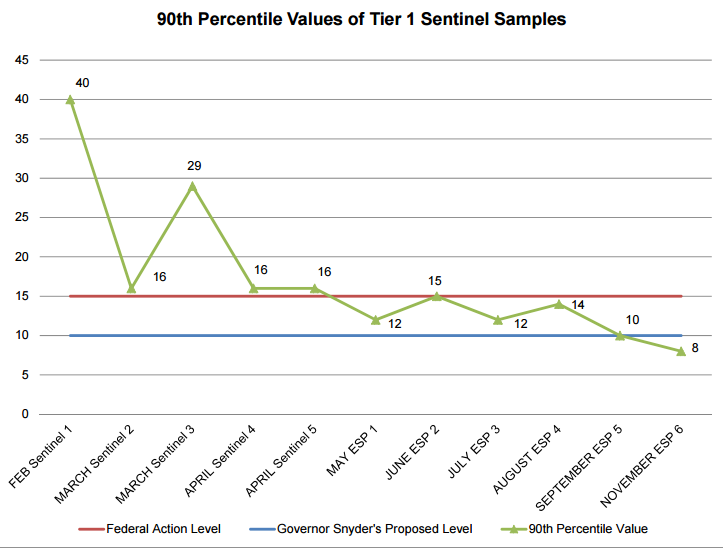Flint Water System Well Below Federal Lead Action Level

The most recent round of Extended Sentinel Site testing for Flint’s water shows significant improvement with more than 96 percent of the samples at or below the 15 parts per billion (PPB) federal lead action level. This is the sixth consecutive time the results have been in compliance with federal rules.
In addition, the 90th percentile, which is the number used to determine compliance with the lead action level, dropped to 8 PPB, which is the lowest level for any sentinel testing and lower than the 10 ppb standard called for by Gov. Rick Snyder earlier this year.
“This latest round of tests is a clear indication of the continued improvement in the Flint water system, and encouraging news for everyone working to help the people of Flint move forward,” Snyder said.
With more than 96 percent of Tier I samples at or below 15 PPB, which is the highest compliance percentage to date, the water system seems to be easily meeting the 90 percent necessary under the Federal Lead and Copper Rule (LCR). A Tier I site is a home that has a lead service line or meets other criteria that make it an eligible location to determine compliance with the federal LCR.
“This data closely parallels with the findings of independent experts, like Dr. Marc Edwards and Virginia Tech University researchers,” said Michigan Department of Environmental Quality Director C. Heidi Grether. “Last week, Dr. Edwards announced that his latest testing results also found that the Flint water system continues to improve significantly.”
The current LCR monitoring period for the city of Flint ends December 31, 2016. This latest round of sentinel testing will be the last for the current calendar year. Official results for the current monitoring period will be announced in early January once a complete review of all of the compliance data has been completed. But based on the all of the Tier I data currently available, the city of Flint appears to meet and even perform better than the federal action level requirements.
In mid-January, the U.S. EPA will be coordinating a meeting of subject matter experts to review data and discuss the current status of the Flint water system. Representatives from the city of Flint, MDEQ and third-party experts will be in attendance.
While the water quality continues to improve, residents are encouraged to continue to use their properly installed and maintained water filters out of an abundance of caution while the lead service line replacement projects are underway.
Government and independent scientists have agreed that filters are effective in the removal of lead for all Flint residents.
To ensure residents have and are properly using their filter, Community Outreach and Resident Education (CORE) team members are providing door-to-door filter education and providing residents with information on other resources that may be available to them. Since January 2016, CORE teams have visited more than 25,000 homes.
Residents also are encouraged to regularly clean their faucet aerators and keep the water moving throughout their homes. Flushing faucets on a daily basis and cleaning faucet aerators weekly will help reduce the presence of lead in individual homes and throughout the Flint water system.
More information is available at www.michigan.gov/flintwater, by calling United Way 211 or by visiting www.helpforflint.com.
Related News
From Archive

- Texas A&M weighs underground transit plan with Elon Musk's Boring Co. to reduce campus traffic
- Lynchburg, Va., breaks ground on largest-ever Blackwater CSO tunnel project
- Wyo-Ben’s Max Gel, Max Bore HDD system boost drilling efficiency, performance
- Federal court halts permits for 32-mile Tennessee gas pipeline project
- CGA’s 2023 DIRT report shows fewer utility damages, urges action on locating delays
- Wisconsin proposes new PFAS drinking water standards to align with federal rules
- Dog River pipeline replacement in Oregon improves water supply with new HDPE pipe
- Leaking wastewater systems named top source of San Diego River contamination, study finds
- New Portable Welding System From Miller
- Excavator Causes Puerto Rico Power Outage



Comments